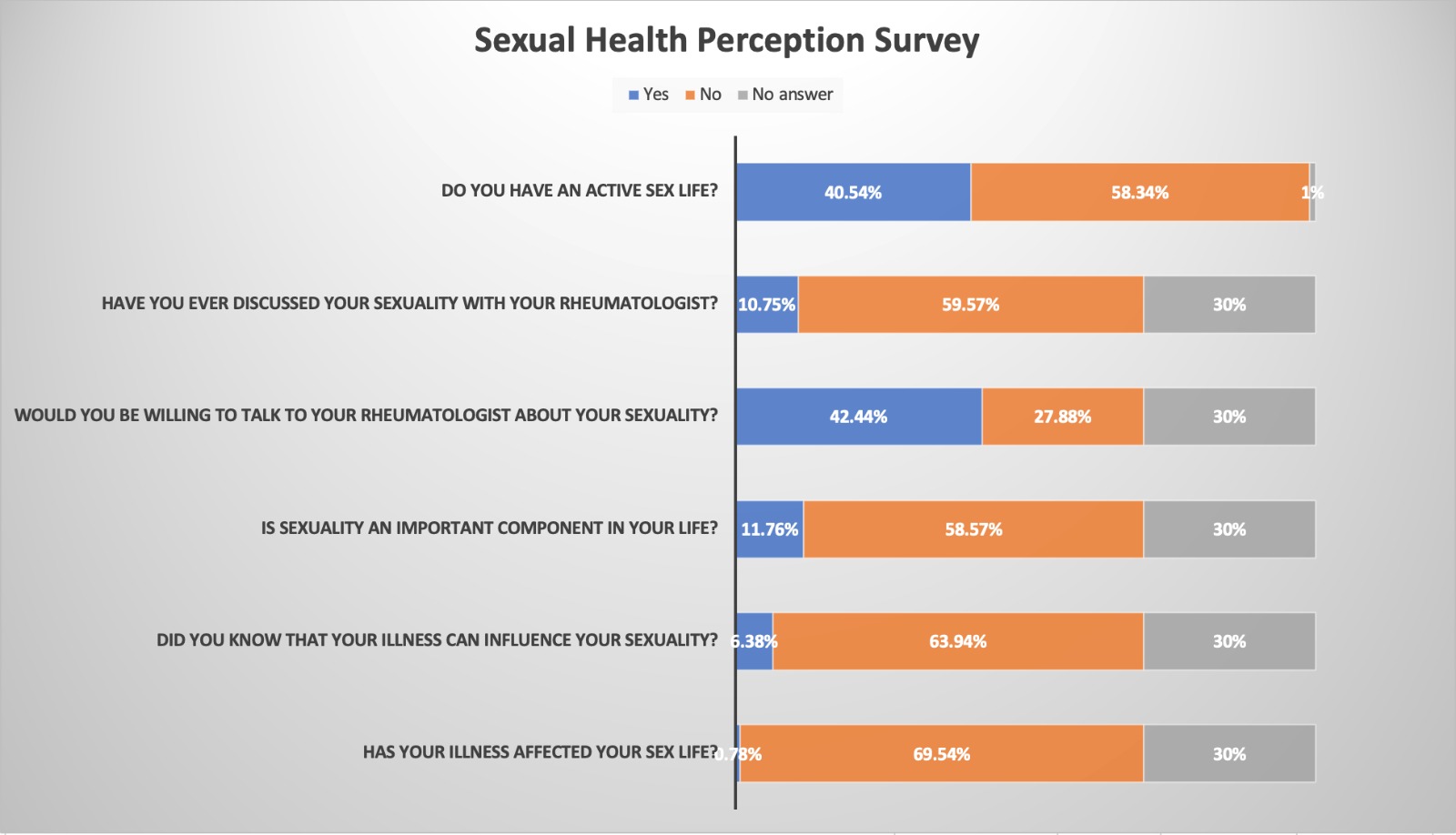Session Information
Date: Sunday, November 12, 2023
Title: (0145–0154) Epidemiology & Public Health – Interprofessional Poster
Session Type: Poster Session A
Session Time: 9:00AM-11:00AM
Background/Purpose: There’s a high prevalence of sexual dysfunction (SD) in patients with rheumatic diseases (RD). Studies show that it goes from a 36% to a 70%, and still they are not regularly addressed in a routine rheumatologic assessment. Self-perception questionnaires applied to patients with rheumatoid arthritis (RA) have reported that most patients don’t share their sexual health concerns with their rheumatologists, even when 32.5% wished their rheumatologist did establish the possibility of doing so. (1)This study aims to describe the prevalence of self-perceived and knowledge of sexual health in patients with RD.
Methods: We conducted a cross-sectional study in patients with at least one rheumatologic disease at an outpatient rheumatology clinic. Those unwilling to answer the questionnaire reliably were excluded. The Sexual Health Perception Survey (SHEPS) was applied and consists of the following questions: 1) Do you have an active sexual life? 2) Have you ever talked to your rheumatologist about your sexuality? 3) Would you be willing to talk to your rheumatologist about your sexuality? 4) Is sexuality an important component in your life? 5) Did you know that your disease influences your sexuality? 6) Has your disease affected your sexual life? Sociodemographic and medical data were collected from patient files.
Results: We screened 893 patients. A third (30%) of patients refused to answer. Of the 628 patients who answered, 362(40.5%) had an active sex life, and 105 (11.76) considered sex an important part of their life. While 379 (42.4%) patients reported they are willing to speak to their rheumatologist about their sexuality, only 96 (10.7%) had spoken to their rheumatologist about it. Only 6.3% (57) patients previously knew their rheumatic disease could affect their sexual life, and less than 1% (7) of the patients considered that their rheumatic disease was affecting their sexual life. A higher prevalence of auto-perceived sexual dysfunction (APSD) was observed in women (91.2%) than men (18.9%). Mean (SD) age in patients with self-perceived APSD was 56.14 (22.74). Most related diagnosis to APSD was Rheumatoid Arthritis (n=3).
Conclusion: The SHEPS results show that even when an important percentage of patients are willing to speak to their rheumatologist about their sexuality, only a small percentage has done it. Also, only a few patients knew their rheumatic disease could influence their sexual life, and even a smaller percentage considers it has been affected by it.
References:
1. Østensen M. Sexual and reproductive health in rheumatic disease. Vol. 13, Nature Reviews Rheumatology. Nature Publishing Group; 2017. p. 485–93.
2. Bay LT, Graugaard C, Nielsen DS, Möller S, Ellingsen T, Giraldi A. Sexual Health and Dysfunction in Patients With Rheumatoid Arthritis: A Cross-sectional Single-Center Study. Sex Med. 2020 Dec 1;8(4):615–30.
To cite this abstract in AMA style:
Vega Sevilla L, Serna-Peña G, Flores-Gutierrez D, Cardenas-De la Garza J, Galarza-Delgado D, Hernandez Galarza I. Sexual Health and Self-Perception in Rheumatologic Patients: Has Your Rheumatologist Ever Talked to You About Sexual Health? [abstract]. Arthritis Rheumatol. 2023; 75 (suppl 9). https://acrabstracts.org/abstract/sexual-health-and-self-perception-in-rheumatologic-patients-has-your-rheumatologist-ever-talked-to-you-about-sexual-health/. Accessed .« Back to ACR Convergence 2023
ACR Meeting Abstracts - https://acrabstracts.org/abstract/sexual-health-and-self-perception-in-rheumatologic-patients-has-your-rheumatologist-ever-talked-to-you-about-sexual-health/

